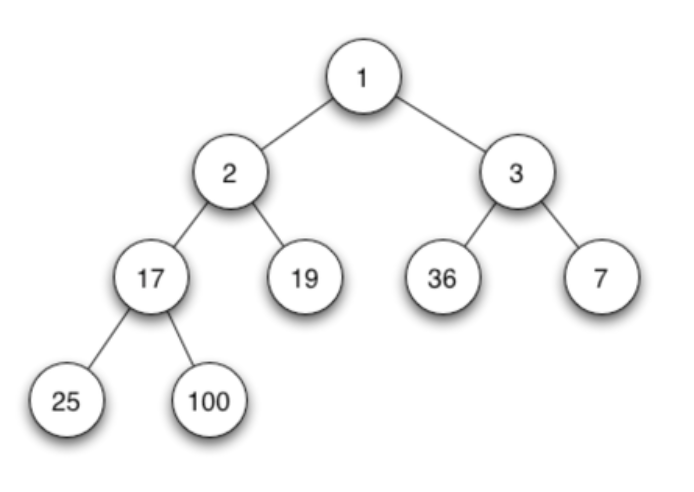-
우선순위 큐CS(ComputerScience) 2021. 5. 17. 14:49
안녕하세요. 그린입니다🟢
이번 포스팅에서는 우선순위 큐를 Swift로 구현하는것에 대해 알아보겠습니다🧑🏻💻
먼저 우선순위 큐가 무엇인지? 간단히 알아보겠습니다!
우선순위 큐
: 우선순위를 가진 자료들의 큐로 순위가 높은 자료가 먼저 실행 (FIFO)
-> 힙구조
-> 완전이진트리 (힙은 완전이진트리)
-> 완전이진트리: 마지막 노드 레벨외 나머지 노드 레벨이 전부 채워진 형태의 이진트리
-> 힙활용: 최대,최소 계산 / 힙정렬(우선순위큐)

-> 스위프트에서는 배열로 표현하는게 효율적
-> 노드 레벨이 올라갈수록 노드 수 2배씩 증가
-> 부모노드 i / 자식노드: 2i+1 / 2i+2
-> 트리는 O(log n) / 배열은 O(1)
Swift 코드로 구현하기
import Foundation struct Heap<T: Comparable> { var nodes: [T] = [] let sort: (T,T) -> Bool init(sort: @escaping (T,T) -> Bool) { self.sort = sort } // Heap에 데이터 추가 (push) mutating func insert(_ element: T) { let count = nodes.count nodes.append(element) up(count - 1) } // Heap에서 데이터 꺼내면서 삭제 (pop) mutating func delete() -> T? { if nodes.isEmpty { return nil } if nodes.count == 1 { return nodes.removeFirst() } nodes.swapAt(0, nodes.count - 1) let result = nodes.removeLast() down(0) return result } // Heap에서 특정 데이터 삭제 mutating func remove(_ element: T) { if let index = nodes.firstIndex(of: element) { nodes.swapAt(index, nodes.count - 1) nodes.removeLast() up(index) down(index) } } // Heap에서 데이터 전체 삭제 mutating func removeAll(_ element: T) { var count = nodes.count remove(element) while nodes.count < count { remove(element) count = nodes.count } } // Heap에서 첫 데이터 pop func peek() -> T? { return nodes.first } // Heap 데이터 아래방향으로 비교 정렬 mutating func down(_ index: Int) { var index = index let count = nodes.count while 2 * index + 1 < count { var i = 2 * index + 1 if i < (count - 1) && sort(nodes[i], nodes[i + 1]) { i += 1 } if !sort(nodes[index], nodes[i]) { break } nodes.swapAt(index, i) index = i } } // Heap 데이터 윗방향으로 비교 정렬 mutating func up(_ index: Int) { var index = index while index > 0 && !sort(nodes[(index - 1) / 2], nodes[index]) { nodes.swapAt((index - 1) / 2, index) index = (index - 1) / 2 } } } var queue: Heap<Int> = Heap<Int>() { return $0 > $1 } queue.insert(3) queue.insert(5) queue.insert(2) queue.insert(1) queue.insert(6) queue.insert(7) queue.insert(4) // nodes: [7, 5, 6, 1, 3, 2, 4] -- 결과값위와 같이 코드로 구현을 해봤습니다.
데이터들이 들어올때 부모 노드와 비교하여줍니다. 그리고 추가/삭제 등이 일어날때 해당되는 up/down 메서드를 통해 비교 탐색하며 스왑해주며 우선순위 큐에 맞게 다시 정렬해줍니다.
최종 아래에 값들을 추가해주고 찍어보면 우선순위대로 노드 레벨간 지정이 되있음을 확인할 수 있습니다.
'CS(ComputerScience)' 카테고리의 다른 글
큐 (Queue) (0) 2021.05.19 스택 (0) 2021.05.18 멀티프로세스 VS 멀티스레드 (0) 2021.04.30 Cache (0) 2021.02.04 HTTP & TCP/IP (0) 2021.01.18